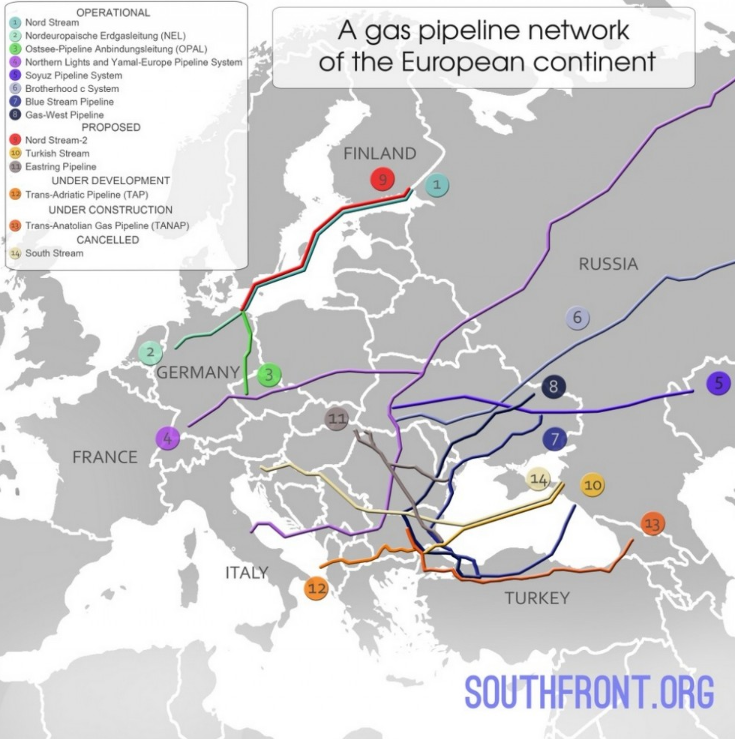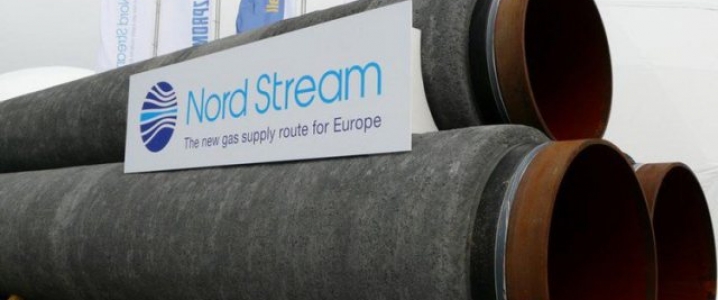Europe’s position as an arena for great power rivalry ended after the Cold War. In recent days, however, the continent has, again, become a theatre of conflict. Only this time energy is at the centre of the political clash. The construction of the subsea Nord Stream 2 pipeline from Russia to Germany is opposed by an alliance of countries and the European Commission, while Berlin adamantly supports the project. Washington has further raised the stakes by threatening to implement sanctions on companies involved in construction work. Last week, an essential gathering of energy ministers in Brussels decided Nord Stream 2's fate after a tumultuous and surprising 24 hours.
It was expected that the pipeline would be operational starting from November this year. With every passing day, more pipes are welded together and sunk to the bottom of the Baltic Sea. Therefore, time was running out for the critics of the project to obstruct construction work. Last week’s vote was intended to extend EU energy regulation to extraterritorial pipelines such as Nord Stream 2. Germany relied on the support of several other member states to block the vote in its current form.
However, news surfaced on Thursday concerning one of Berlin’s allies, France, which had changed its position in favour of extending EU law to include Nord Stream 2. Gazprom, who holds ownership over the pipeline, opposes any changes to regulation as the energy giant enjoys monopoly export rights for piped Russian gas. EU law, however, stands for a liberal energy market with a healthy degree of competition.
What are the stakes and what went wrong?
When finished, the Nord Stream 2 pipeline will transport 55 bcm of natural gas directly to Gazprom's most prominent customer Germany instead of the existing infrastructure through Central Europe. This would save the company $3 billion annually in transit fees and cost Ukraine approximately 3 percent of its GDP. Poland also stands to lose as some of the gas is transported through its pipeline infrastructure. Critics of the project also fear the eroding of Ukraine’s bargaining position vis-à-vis Russia regarding future energy deals. Related: U.S. Sanctions, OPEC Cuts Create Rare Oil Price Shakeup

Nord Stream 2, however, is of vital importance to the German economy and its energy transition due to the phasing out of nuclear power until 2022 and coal-fired power plants until 2038. Although Berlin has approved the construction of the first LNG import terminal of the country, piped gas is still significantly cheaper than LNG. This is reflected in the participation of major German energy companies in the construction of Nord Stream 2 such as Wintershall and Uniper.
Therefore, the news of France making the U-turn concerning support for Nord Stream 2 was met by surprise in Berlin due to the vital importance of the French vote to achieve a ‘blocking minority' in the meeting of energy ministers. Paris is not hugely in favour of the project, but the French don’t want to look as if they are caving in to pressure from Washington and support for their allies in Berlin is valued more than opposition towards the pipeline. Related: Green New Deal Critics See Red
Last minute negotiations, however, resulted in a compromise which most likely closes this chapter within the European context. The two EU countries have now agreed on oversight that will come from the “territory and territorial sea of the member state where the first interconnection point is located”, according to a copy of the draft. This practically means that Berlin will decide Nord Stream 2’s fate and that opposition from Brussels is muzzled.
Controversy versus realism
Assuming that Berlin and Paris hadn’t come up with a compromise, would the pipeline have been finished? The answer is: most likely yes. According to Katja Yafimava, a senior research fellow at the Oxford Institute for Energy Studies, “the European Commission believed the amendment would put it into a position of strength vis-à-vis Russia or Gazprom, in my view this is an illusion”. Suspending or blocking Nord Stream 2 would have created problems down the road. Capacity for the EUGAL pipeline onshore in Germany to transport gas has already been booked by customers willing to buy Russian energy. All these commercial deals have been made according to existing legislation which would have created significant litigation in case these contracts were violated.
A critical ‘wild card' in the ongoing saga concerning Nord Stream 2 is the U.S. Despite Washington's rhetoric regarding its benign motives, most observers believe ulterior reasons are behind its opposition: substituting Russian gas with American LNG. President Trump's confrontational political style and troubled relations with German Chancellor Merkel don’t make it likely that Berlin will cave in to pressure. Germany will not easily accept American sanctions meant to bloc Nord Stream 2 from reaching completion. German Foreign Minister Heiko Maas has called sanctions "not the way to go" and that "European energy policy must be decided in Europe, not in the U.S.".
ADVERTISEMENT
By Vanand Meliksetian for Oilprice.com
More Top Reads From Oilprice.com:
- Maduro Asks OPEC For Help As U.S. Sanctions Bite
- Tax Cuts Or Not, Mexico’s Pemex Is Doomed
- South Africa Oil Discovery Could Be A Game-Changer



















The first is that Germany and Russian gas giant Gazprom have always considered Nord Stream 2 first and foremost an economic project which will bring uninterrupted and cheap Russian gas supplies to Germany and the European Union (EU) thus ensuring energy security to the whole of the EU. Germany needs more gas supplies since it is on the way to phasing out coal-fired generation by 2038 with the aim of cutting carbon emissions and also phasing out nuclear electricity by 2022. And Gazprom is looking forward to expanding both its business and return on investments worldwide. Therefore, expanding an already-dominant position in the EU’s gas market should be no exception. Gazprom could be looking forward to enhancing its market share from the current 35% to more than 45%-50% in the next decade.
The second factor is that even if the United States decided to impose sanctions on European companies involved in the financing and the construction of Nord Stream 2, Gazprom and Germany can finance the project without any need to borrow money.
The third factor is that the German Chancellor Angela Merkel would have never succumbed to US threats of sanctions against her country. She believes that EU energy policies should be determined in Europe and not in Washington.
A fourth factor is that Nord Stream 2 will bring extra Russian gas supplies to the EU at a time when the EU demand for gas and LNG is growing by leaps and bound whilst European gas production is projected to decline significantly particularly with the planned shutdown of the Groningen gas field in the Netherlands by 2030. Moreover, the International Energy Agency (IEA) is projecting that EU gas production will halve by 2040.
A fifth factor is that the majority of Europeans believe that US opposition to Nord Stream 2 has far less to do with Russia’s tightening its grip on the EU gas market and far more to do with self-interest, namely replacing Russian piped gas with US LNG exports.
A sixth factor is that US LNG prices can never match the price of Russian piped gas now or for the foreseeable future.
Dr Mamdouh G Salameh
International Oil Economist
Visiting Professor of Energy Economics at ESCP Europe Business School, London
Huawei is the only company in the world that manufactures all the elements of an advanced 5G network and can assemble them at scale and cost.
Non-Huawei customers like Aermican telecoms, must integrate more costly, less functional, less compatible and less upgradeable elements, pay twice as much, take twice as long to implement 5G and experience inferior service.
That's because Huawei produces every element of 5G systems and assembles turnkey networks–made from its own patented antennas, power stations, chips, servers and handsets that all outperform Qualcomm's–at scale and cost. It is literally unrivalled in enhanced mobile broadband.
The EU would fall behind the US and China in the race to install the next generation of wireless networks if their governments ban Chinese equipment.
Deutsche Telekom AG, Europe’s largest telecommunication company, warned that removing Huawei from the list of suppliers of 5G networks would delay roll-out of the technology by two to three years.